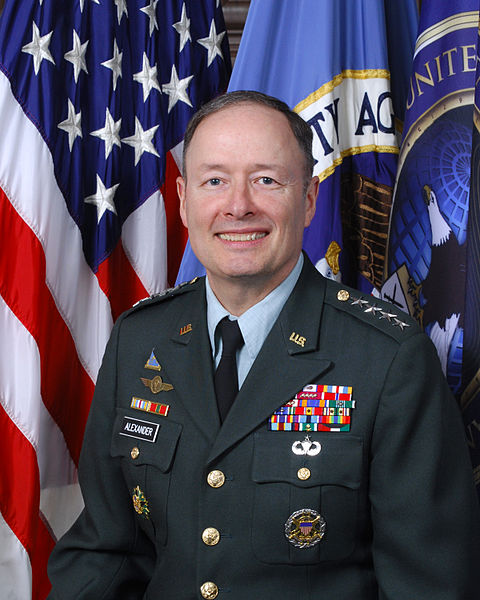

Keith Alexander is said to be "stepping down" and the above quote is a nice joke found in Twitter. Mr. Alexander is not going to be sued and he is not going to jail, either. When people have loyalty to a flag rather than loyalty to human values and principles, then as long as they stay within the country of that flag, they'll enjoy immunity (Bush and Kissinger can't travel much around the world, for fear of getting jailed for war crimes).
In this email message to colleagues, Israeli cryptographer Adi Shamir recounts the difficulties he faced in getting a visa to attend the 2013 Cryptologic History Symposium sponsored by the National Security Agency. Adi Shamir is the “S” in the RSA public-key algorithm and is “one of the finest cryptologists in the world today,” according to historian David Kahn. The NSA Symposium begins tomorrow. For the reasons described below, Dr. Shamir will not be there.
Time and again GCHQ and other intelligence agencies have spuriously used 'national security arguments' to suppress information and stifle debate
Yesterday word leaked out that Glenn Greenwald would be leaving The Guardian to help create some new thing backed by Pierre Omidyar, the founder of eBay. I just got off the phone with Omidyar and can report more details about what the new thing is and how it came to be.
[...]
NewCo is new venture— a company not a charity. It is not a project of Omidyar Network. It is separate from his philanthropy, he said. He said he will be putting a good deal of his time, as well as his capital, into it. I asked how large a commitment he was prepared to make in dollars. For starters: the $250 million it would have taken to buy the Washington Post.
He is an “asylee,” not a “fugitive,” as the mainstream media in America describe him routinely—even some of the trusted journalists who write exclusives based on his revelations. An asylee has the right to be left alone, not hunted like an animal. But similar to WikiLeaks founder Julian Assange, Snowden is in a new purgatory the US has created: free but not free. Snowden is technically free, but still circumscribed by the specter of his home country, which refuses to recognize Russia’s grant of political asylum under international law and human rights agreements.
As we noted last month, from earlier comments Ed Snowden had made about it being impossible for him to reveal the documents he leaked to the Russians or Chinese, it seemed quite likely that he got rid of the documents and had no copies any more himself. This seemed even more likely after the report from earlier this week that the four laptops he took were more of a diversion than anything else. And now, Snowden has confirmed directly that he handed the documents off to Laura Poitras and Glenn Greenwald and did not keep copies for himself, as he's now explained to the NY Times' James Risen.
Parliament's intelligence watchdog is to hear evidence from the public as part of a widening of its inquiry into UK spy agencies' intercept activities.
Allegation relates to eight Libyan nationals and comes in wake of Guardian's revelations about GCHQ and Tempora programme
The city of Oakland is taking two popular buzzwords—“Big Data” and “surveillance state”—and combining them into a new program to aid in law enforcement.
Joining similar police initiatives in Massachusetts, Texas and New York City, the Oakland Police Department is re-appropriating US$7 million in federal grants initially purposed for preventing terror attacks, and using it to construct a new surveillance center. Scheduled to open next summer, the project, formerly referred to as Oakland’s Domain Awareness Center, will electronically gather and analyze data around the clock from a variety of sensors and databases, displaying selected info on a bank of giant monitors.
Five years after Congress authorized warrantless electronic spying, the Obama administration has never divulged to a single defendant that they were the target of this type of phone or email surveillance — despite lawmakers’ claims the snooping has stopped terrorist plots and resulted in arrests.
Five years after Congress authorized a sweeping warrantless surveillance program, the Justice Department is setting up a potential Supreme Court test of whether it is constitutional by notifying a criminal defendant — for the first time — that evidence against him derived from the eavesdropping, according to officials.
Privacy is often misconstrued as a purely individual right – indeed, it is sometimes characterised as an ‘anti-community’ right, a right to hide yourself away from society. Society, in this view, would be better if none of us had any privacy – a ‘transparent society’. In practice, nothing could be further from the truth: privacy is something that has collective benefit, supporting coherent societies. Privacy isn’t so much about ‘hiding’ things as being able to have some sort of control over your life. The more control people have, the more freely and positively they are likely to behave. Most of us realise this when we consider our own lives. We wear clothes, we present ourselves in particular ways, and we behave more positively as a result. We talk more freely with our friends and relations knowing (or assuming) that what we talk about won’t be plastered all over noticeboards, told to all our colleagues, to the police and so forth. Privacy has a crucial social function – it’s not about individuals vs. society. Very much the opposite.